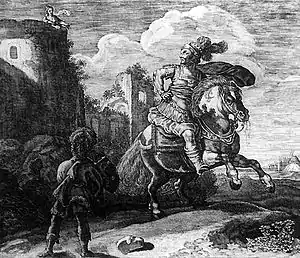Nisos
In Greek mythology, Nisos or Nisus (Greek: Νῖσος) was the King of Megara.
Family
Nisos was one of the four sons of Pandion II, King of Athens and thus brother of Aegeas, Pallas, and Lykos. According to Hyginus, his father was the god Ares[1] while other authors affirmed that he was the offspring of Deion, son of Aeolus.[2]
Nisos was married to Abrota, sister of Megareus, and when she died, Nisos commanded that the Megarian women wear clothes like she had.[3] His daughter Eurynome, with Poseidon, had the famous son Bellerophon.[4] His second daughter Iphinoe married Megareus, her maternal uncle.[5] The third daughter Scylla was responsible for Nisos' death.
Mythology
Metion, the uncle of Nisos, had seized the throne from Pandion II. However, upon their father's death, Nisos and his brothers returned to Athens and took back control. They drove out the sons of Metion, put Aegeus on the throne, and divided the government in four. Aegeas became king of Athens, and Nisos the King of Megara.[6]
Minos, King of Crete, attacked Nisos's kingdom during a war with Athens over the death of his son Androgeus. Nisos however had a lock of purple hair that kept him safe from harm.[7] Eros caused his daughter Scylla to fall in love with Minos.[8] In one version, Minos tempts Scylla with a golden necklace to betray and kill her father.[9] In another version, she fell in love with Minos from a distance, and after cutting off the purple lock, she presented it to Minos. However, Minos was disgusted with her act, calling her a disgrace. As Minos's ships set sail, Scylla attempted to climb up one of them. But Nisos, who had turned into a sea eagle or osprey, attacked her. His daughter transformed into a bird as well. There is also a version with Ares.[10] According to another account Nisos killed himself when he lost his vital lock of hair.
References
- Homer. The Odyssey, Book 16.393 & 16.9 Rendered into English prose for the use of those who cannot read the original. Samuel Butler. Based on public domain edition, revised by Timothy Power and Gregory Nagy. A. C. Fifield, London. 1900
- Hyginus. Fabulae, 198 & 242. Translated and edited by Mary Grant. University of Kansas Publications in Humanistic Studies
- Plutarch. Moralia, 4.21.16.
- Hesiod. Catalogues, Fragment 7.
- Pausanias, Description of Greece, 1. 39. 6
- Pseudo-Apollodorus, Bibliotheca 3.15.6.
- Ovid. Metamorphoses, 8.5.
- Nonnus. Dionysiaca, 25.150.
- Aeschylus. The Libation Bearers, 610.
- Ovid. Metamorphoses, 8.90.
